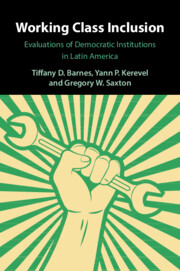Book contents
- Working Class Inclusion
- Working Class Inclusion
- Copyright page
- Contents
- Figures
- Tables
- Acknowledgments
- 1 Introduction
- 2 A Theory of Working-Class Inclusion
- 3 Do Citizens Want to Be Represented by Workers?
- 4 Will Any Worker Do? The Role of Policy in Linking Workers’ Presence to Evaluations of Representatives
- 5 Will Any Worker Do? Linking Parties to Workers in Argentina and Mexico
- 6 How Do Citizens Know Workers Are in Office?
- 7 How Do Citizens Know Workers Are in Office?
- 8 Conclusion
- References
- Index
5 - Will Any Worker Do? Linking Parties to Workers in Argentina and Mexico
Published online by Cambridge University Press: 26 October 2023
- Working Class Inclusion
- Working Class Inclusion
- Copyright page
- Contents
- Figures
- Tables
- Acknowledgments
- 1 Introduction
- 2 A Theory of Working-Class Inclusion
- 3 Do Citizens Want to Be Represented by Workers?
- 4 Will Any Worker Do? The Role of Policy in Linking Workers’ Presence to Evaluations of Representatives
- 5 Will Any Worker Do? Linking Parties to Workers in Argentina and Mexico
- 6 How Do Citizens Know Workers Are in Office?
- 7 How Do Citizens Know Workers Are in Office?
- 8 Conclusion
- References
- Index
Summary
Chapter 5 turns to an examination of the ties between working-class representatives and constituents, by taking an in-depth look at the relationship between labor unions, political parties, and workers in Argentina and Mexico. We show that the evolution of unions and parties throughout history lead to working-class deputies in Argentina having stronger ties to workers and a better track record of policy representation than working-class deputies in Mexico. Then we leverage an original dataset of working-class representation over time and across states in Argentina and Mexico to show empirically that whereas increases in working-class representation in Argentina are associated with citizens evaluating their representative institutions more positively, the increased presence of working-class legislators in Mexico leads to backlash and more negative evaluations of legislatures and political parties.
- Type
- Chapter
- Information
- Working Class InclusionEvaluations of Democratic Institutions in Latin America, pp. 125 - 153Publisher: Cambridge University PressPrint publication year: 2023

